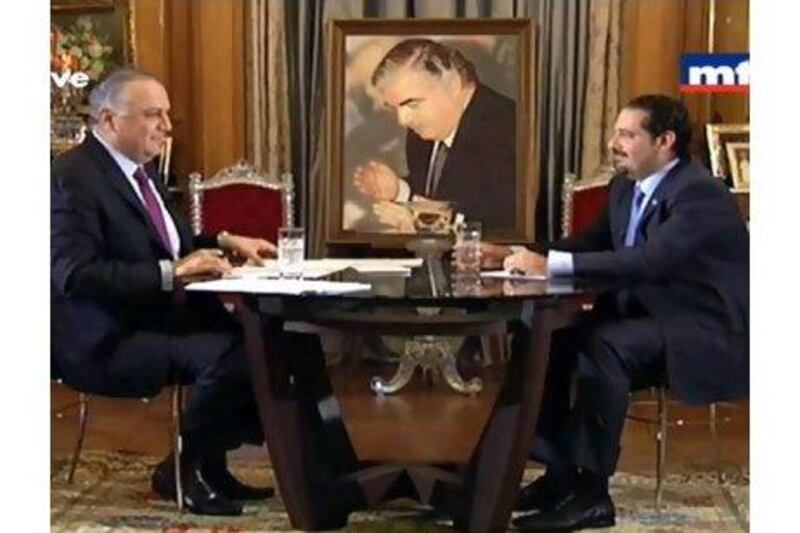BEIRUT // Gunshots and fireworks accompanied the first major television appearance in months by Saad Hariri, Lebanon's former prime minister and current opposition leader.
He had sharp words for the rival Hizbollah movement, which now controls the government along with its allies.
Mr Hariri sounded particularly fiery in his defence of the UN-backed international tribunal that is dealing with the murder in 2005 of his father, Syria's then prime minister, Rafiq Hariri, and warned that "in the end, Lebanon will pay the price" if Hizbollah blocks the arrest of the suspects in the killing.
Rafiq Hariri was killed along with 22 others in a massive car bomb in the centre of Beirut.
But the celebratory gunshots from Saad Hariri's supporters in Beirut had a somewhat hollow ring to them as Mr Hariri was speaking from Paris.
The televised interview on Tuesday night from such a distance underscored the dramatic loss of political power by Lebanon's western and Saudi Arabia-backed bloc, which he heads.
Mr Hariri arrived in Paris with his family about one month ago, amid rumours that his safety had been under threat, which he denied.
Hizbollah and its allies brought down Mr Hariri's national unity government in January because of disagreement over co-operation with the Netherlands-based Special Tribunal for Lebanon (STL), which is investigating the elder Hariri's murder.
In Tuesday night's television interview on Lebanon's MTV channel, Saad Hariri upbraided Hizbollah and its leader, Hassan Nasrallah, for attempting to undermine the credibility of the STL. The tribunal has issued an indictment and arrest warrants for four Hizbollah members at the end of June. Hizbollah has sworn not to hand over the suspects and has denied involvement in the killing.
Mr Hariri made clear that he would not let the matter rest. "Even if Hassan Nasrallah holds 300 press conferences, that will not alter the indictment in any way," he said in response to a speech by Hizbollah's leader.
The tit-for-tat statements by Mr Nasrallah and Mr Hariri risk raising both the political and the sectarian tensions in the country, although both leaders stress they have been seeking to avoid inter-communal strife.
Hizbollah is a symbol for the Shiite community, while the murdered billionaire businessman Rafiq Hariri was the pre-eminent Sunni political leader, a role now taken up by his son.
"This can fan the sectarian flames," warned Amal Saad Ghorayeb, an academic who has written a book about Hizbollah. "It is something that Nasrallah is very worried about."
Mr Hariri also stressed that he had not accused "a certain sect".
Yet the website of the Hizbollah affiliated Al Manar television station responded sharply to Mr Hariri's words yesterday. "It seems that the former premier Saad Hariri is determined to turn a deaf ear to the evidences presented by Hizbollah over the politicisation of the Special Tribunal for Lebanon," one of its reporters wrote.
Hizbollah has accused the tribunal of being an American and Israeli tool for attacking the movement and many in the Shiite community are convinced of the group's innocence.
"If you look at what happened, this is just not Hizbollah's modus operandi," said Mrs Saad-Ghorayeb.
The confrontation between Mr Hariri's March 14 coalition and the March 8 bloc to which Hizbollah belongs is taking place in the context of strong regional and international pressure.
The heavily armed Hizbollah movement, which has profiled itself as first and foremost a resistance against Israel, has been concerned over upheaval in neighbouring Syria, one of its main allies along with Iran.
Mr Hariri has accused Hizbollah of being able to dominate the politics in the country because of its arms.
"The weapons are the cause of the problem in Lebanon. Hizbollah does not know what to do with its arms. It is our problem with Hizbollah and also it is a problem for Hizbollah."
Hizbollah fought a devastating war with Israel in July 2006 but it was also involved in clashes with Mr Hariri's supporters in May 2008, in which more than 80 people died.





